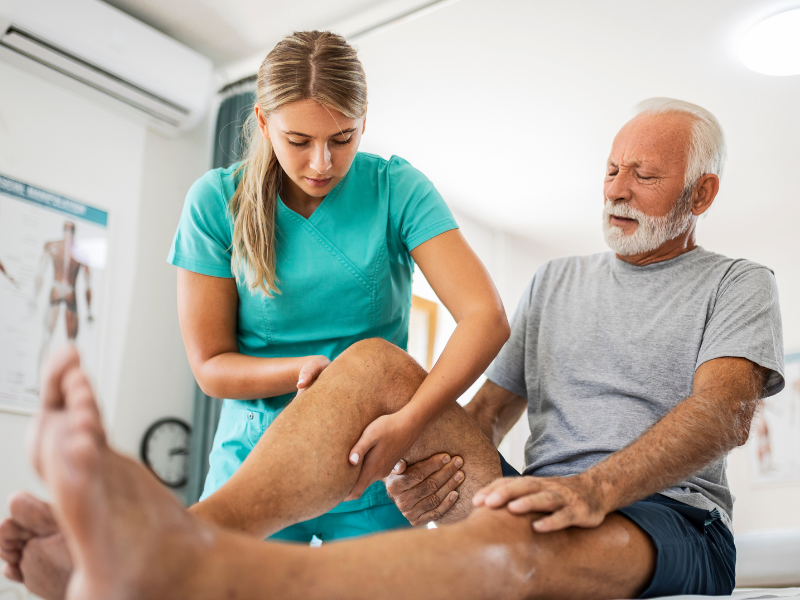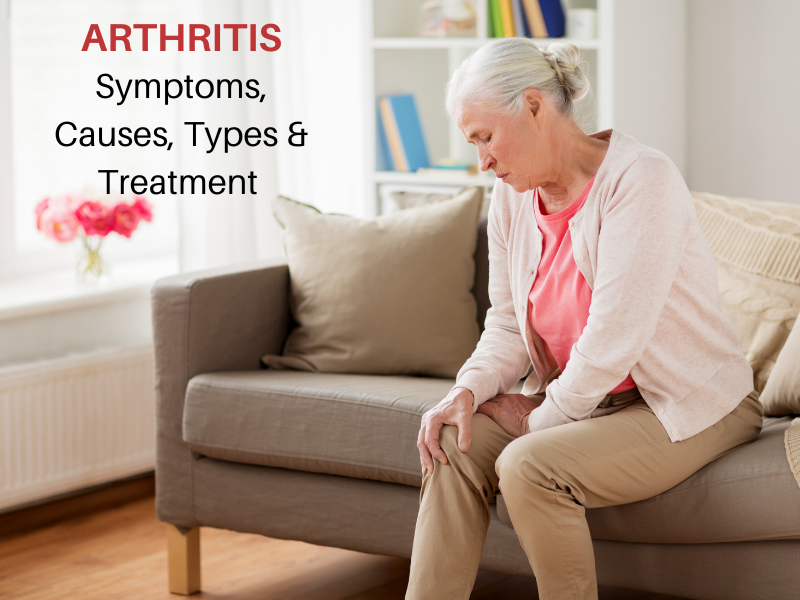Stiff, aching bones. Gnarly knuckles. Ring a bell?
Those are some (not very) lovely accompaniments of arthritis. If you can predict the weather based on the stiffness in your bones, then you probably suffer from this condition.
Arthritis refers to the swelling and tenderness in your joints and connective tissue, causing you discomfort and pain. About 26% of Americans are estimated to suffer from chronic pain, and at least half of them are experiencing pain due to arthritis.
There are about 100 or more different types of arthritis that can affect your bones in different ways and requires a variety of treatments. Arthritis can break down and degenerate your joints to the point where using them becomes painful with every movement.
There are multiple treatments available for this condition, but knowing what the causes and symptoms of arthritis are can be highly beneficial. This can help you take precautions early on.
And that is precisely what we will be telling you about in the article today. Let’s begin!
Types of Arthritis
Osteoarthritis: This is the most common type of arthritis and is a chronic disease of the joints. It especially affects the weight-bearing joints, i.e., the hips, knees, and spine. Osteoarthritis degenerates the cartilage coating at the ends of your bones, leading to bone overgrowth, bone spurs, and loss of joint function.
Rheumatoid Arthritis: This type of arthritis is also considered as an autoimmune disorder. Rheumatoid arthritis is a condition where your body’s immune system revolts and begins to attack the tissues of your body, beginning with bone inflammation and spreading to other parts of your body.
Some other types of arthritis include:
- Scleroderma
- Lupus
- Juvenile idiopathic arthritis
- Gout
- Ankylosing spondylitis
Causes of Arthritis

The reasons behind arthritis are largely unknown, but researchers continue exploring this field to pinpoint why this condition is found in people. Your lifestyle and genetics may potentially play an important role in its occurrence.
There are several factors that can heighten your risk of getting arthritis.
Age
As you grow older, your joints wear down with time. This increases your risk of developing arthritis with age. Osteoarthritis and rheumatoid arthritis are especially common with age.
Genes
Certain types of arthritis, such as lupus, ankylosing spondylitis, and rheumatoid arthritis, are said to run in families genes, making future generations much more susceptible to this condition.
Excess Weight
Being overweight or obese can force your joints to bear extra weight, increasing the wear and tear your bones experience. This can increase the risk of arthritis in your knees, especially osteoarthritis.
Working hard to lose excess weight can reduce your risk of arthritis, even if you already have it.
Work
If you work at a job where you have to use your joints in the same repetitive motions, such as bending or squatting multiple times daily, you might be at a higher risk of developing arthritis.
Injuries
A joint that has suffered some form of injury is more likely to suffer from arthritis at a later stage than a joint that has not had any injury.
Sex
Women are more likely to develop arthritis, especially rheumatoid arthritis, than men. Gout, however, is more common among men.
Symptoms of Arthritis

The different types of arthritis have different symptoms, and the intensity of these signs may vary from person to person.
Osteoarthritis does not usually cause any external symptoms outside the joint. Other types of arthritis may be accompanied by fatigue, rash, fever, and some significant signs of joint inflammation.
Symptoms of Osteoarthritis
- Joint pain, swelling, and stiffness
- Warm and tender joints
- Clicking or popping sounds while bending
- Limited range of motion that gets better after some movement
- Bony growths in fingers
- Muscle weakness around the affected joint
- A grating or scraping feeling around the knees
Symptoms of Rheumatoid Arthritis
- More than one affected joint with pain, swelling, stiffness, and tenderness
- Morning joint stiffness that sometimes lasts longer than 30 minutes
- Low-grade fever
- Inflammation of the mouth and eyes
- Heavy fatigue
- Low red blood cell count
- Inflammation of the heart’s blood vessels
Treatment Options for Arthritis

When talking about treating arthritis, it is important to note that the main aim is to prevent additional damage to the joints and minimize the pain you are experiencing from this condition. How your arthritis will be treated depends on your age, symptoms, how severe your condition is, and your general health.
Medications
Medications prescribed for pain relief and inflammation reduction may include:
- Analgesics, including acetaminophen, aspirin, and tramadol
- Non-steroidal anti-inflammatory drugs that can be purchased over the counter, including ibuprofen and naproxen
- Counter irritants containing menthol or capsaicin can reduce irritation and pain.
Hot & Cold Compress
Using a hot and cold compress to ease pain can also be beneficial. You can either use dry heat (heating pad) or moist heat (warm bath). Wrap some ice cubes in a towel for a cold compress and apply them to the joint.
Occupational Therapy
Protecting your joints from further wear and tear is an integral part of treating arthritis. You can use the help of an occupational therapist who can tell you how to:
- Use your stronger joints and muscles and spare the weaker ones
- Avoid positions that strain your joints
- Use grab bars in the bath
- Provide splints and or braces to support certain joints
- Use modified walkers, doorknobs, and canes
- Use devices to help you with challenging tasks such as opening jars or heavy doors.
Diet
Consuming a balanced diet can aid people suffering from arthritis and reduce their pain. Some foods that contain nutrients that are good for joint health include:
- Fruits and vegetables
- Beans
- Nuts and seeds
- Olive oil
- Fish
- Whole grains
Completely avoid or limit your intake of processed foods and anything else that contains processed sugar, carbohydrates, and artificial fat. These foods can make your joint inflammation worse.
Surgery
In case of extremely worse cases of arthritis, people might opt for joint replacement surgery to help reduce the pain.
Alternative Medicine
Alternative medicine, such as employing herbs, using acupuncture, and opting for regenerative therapies, can also be used to battle arthritis. Alternative medicine is a newfound field that can aid people in fighting various conditions and is a non-invasive method of treating health issues.
Living with Arthritis – The Bottomline
Persistent pain in your joints can make life quite challenging. Every activity that you perform becomes a difficult task. With early diagnosis and treatment, you may potentially be able to prevent damage to your joint tissues and minimize the pain and level of disability resulting from arthritis. The right treatment for this health condition can greatly reduce your symptoms.
Learn more about arthritis and its causes, symptoms, and treatment options by joining the Regenerative Masters community. Contact us today by sending us your details at info@regenerativemasters.com.

